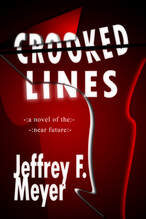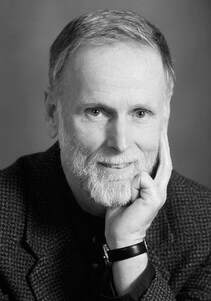 Available in print and e-Book Available in print and e-Book Fans of Jeffrey F. Meyer may be surprised to know that he was a member of the Franciscan Order and studied to be a priest for seven years. This important time in his life, combined with thirty-five years as a professor of Religious Studies, informs, inspires, and influences his latest novel, Crooked Lines. Crooked Lines follows Jeffrey's award-winning debut historical fiction novel, A Call to China, heralded by Kirkus Reviews as "An engrossing fictional exploration of family, culture, and what it means to belong in both China and America." Set in the late 2020s, Jeffrey's latest visionary work of fiction asks the question: Can our hero and his strange band of friends find the courage to restore democracy to an America teetering dangerously on the precipice of authoritarian rule? When asked about his motivation to write, Jeffrey notes, "Since I retired from UNC Charlotte in 2008, I have spent most of my time writing fiction, a first novel that I could never get right, then A Call to China, now Crooked Lines, and I’m working on another novel, now about half way through the first draft. I consider myself lucky to have this inner urge to write fiction¸ which I suppose was inborn, something in my heart and mind that can’t be fully explained." And Crooked Lines is no ordinary literary journey. The reader will encounter action, humanity, humor, and serious issues, all wrapped into a framework based upon an abridged translation of the Chinese classic Journey to the West. This pilgrimage story follows a famous Buddhist monk traveling from China to India in order to bring back to his native country all the sacred scriptures that were lacking in China. The monk seems unlikely to succeed. In Crooked Lines, Bishop Donovan is an ordinary man, neither brilliant nor possessed of heroic virtue. Set in a future where authoritarian governments have taken hold around the world and the planet heads toward a climate disaster, Bishop Donovan and two unlikely companions—an Asian monk and a former pro-football player—risk everything to share a way forward with the world. Accepting the complexity of all human beings, Crooked Lines also deals with a number of important issues: authoritarian government, the threat of climate change, the intersection of religion and politics, the place of faith in a cynical world, women’s role in traditional religious institutions, and the meaning of success and failure as individuals and institutions strive to realize their ideals. We chatted with the author about his new novel in advance of it's upcoming release. Crooked Lines is available September 18, 2020 in print and e-Book. Interview with author Jeffrey F. Meyer What fact about yourself would surprise your fans? Readers might be surprised to know that I was a member of the Franciscan Order, studying to be a priest, for seven years. I left the order about a year and a half before ordination, but my time in the Order was very important in my life. I became aware that a number of my colleagues who also left the Order resented the time wasted and years lost. I did not. I felt that I gained a lot by the experience, maybe the most important thing was learning how to live in a community. Another thing was learning of the importance of religion or spirituality in human life, a conviction I have never lost. That conviction is obvious in Crooked Lines, as it is in all my writings, fictional and academic. Where do you find joy in life? Exploration and travel. Learning about nature, in the manner of Mary Oliver (for its spiritual meaning), and exploring and foreign lands and peoples. I’ve spent, for example, about three years of my life in Asia, mostly China and Taiwan, amazed and intrigued at times at how different these cultures are from my own, and at other times marveling at how much alike all of us are, from the east or west, as human beings. Tell us something about Crooked Lines that's not in the summary. The inspiration for Crooked Lines comes from an Asian source. About three years ago I was reading an abridged translation of the Chinese classic Journey to the West, a sort of pilgrimage story in which a famous Buddhist monk goes from China to India in order to bring back to his native country all the sacred scriptures that were lacking in China. The monk seems unlikely to succeed. He is often diffident, somewhat fussy about his own comfort. How will he be able to make the arduous and dangerous journey across the Silk Road to India? He does it by finding three companions who will accompany and help him, the chief one being Monkey, probably the most popular character in all of Chinese fiction. The three are mischievous, sometimes badly behaved characters as well as “superheroes” so there is a strong element of fantasy in the novel. My aim was to retell this story in a western setting, preserving the serious religious purpose while using elements of fantasy and humor. What books did you love growing up? As a kid I remember riding my bicycle to the local library in Cincinnati, where I grew up, and checking out books regularly. I read all the Wizard of Oz series, the Hardy Boys (young detectives) stories, and I recall going through an African period, reading stories about its fascinating animals and terrain. I can remember only one title, Treks Across the Veldt, though I read many. These were books written from the imperialist’s point of view, glorifying the big game hunters and explorers, with the actual people of Africa playing secondary roles as scouts and bearers. But early in my teen age years I began to read adult books that left a permanent mark on my mind, like Pearl Buck’s The Good Earth, about a Chinese farmer and his family. Another was J.D. Salinger’s Catcher in the Rye. I was also deeply moved by the Anne Frank story. Why did you pick this particular subject matter to write about? Besides my love for the original story of Journey to the West, I took up this novel as a way to touch on three issues that I consider crucial at this time in American history, and really, world history. The first is the growth of authoritarian governments around the world and the corresponding weakening of democracy, which can be seen right now in the U.S., China, India, the UK, Poland, Hungary, Brazil and the Philippines. The second is climate change, and the third is the role of women in world religions—name me a single world religion where the patriarchal model does not dominate. I hope these issues become more tangible as the reader encounters them in real social settings in the novel.  A professor at the University of North Carolina at Charlotte for thirty-five years, Jeffrey F. Meyer taught Asian religions in the Religious Studies department, with a focus on Buddhism and Daoism. He is married with three grown children and currently living in Davidson, North Carolina. His first novel, A Call to China, is a Silver winner in the 30th Annual Benjamin Franklin Awards and a finalist in the 13th Annual National Indie Excellence Awards and the 2019 NextGen Indie Book Awards. Follow the author on Goodreads.
0 Comments
Your comment will be posted after it is approved.
Leave a Reply. |
Archives
June 2024
Categories
All
|
- Welcome
-
Titles
- A Call to China
- Benny Moon: Racing the Medicine Wheel
- Benny Moon Eats Dirt
- Between the Ocean and the Stars
- The Button Collector
- Clown William
- Clown William and the Lincoln County War
- Clown William and the Wind of Vengeance
- The Cornbread Letters
- Crooked Lines
- First Line of Defense
- Highlights of Palmistry
- Hungry
- Indian Country
- Island Whispers
- JuJu Justice
- Ms. Mulligan and the Enchanted Ice Cream
- Mystery Muffin & Soda Pop Slooth: The Legend of Mr. Creepy
- Mystery Muffin & Soda Pop Slooth: The Ghost of Crippler's Creek
- Path of the Half Moon
- Courses of the Cursed
- Merging Paths
- Surrender
- TimeLock
- TimeLock 2: The Kyoto Conspiracy
- The Timestream Verdict
- Whispers on the Wind
- WWCC Heroes
- Submissions
- News & Updates
- Contact
- Bookstore
- Welcome
-
Titles
- A Call to China
- Benny Moon: Racing the Medicine Wheel
- Benny Moon Eats Dirt
- Between the Ocean and the Stars
- The Button Collector
- Clown William
- Clown William and the Lincoln County War
- Clown William and the Wind of Vengeance
- The Cornbread Letters
- Crooked Lines
- First Line of Defense
- Highlights of Palmistry
- Hungry
- Indian Country
- Island Whispers
- JuJu Justice
- Ms. Mulligan and the Enchanted Ice Cream
- Mystery Muffin & Soda Pop Slooth: The Legend of Mr. Creepy
- Mystery Muffin & Soda Pop Slooth: The Ghost of Crippler's Creek
- Path of the Half Moon
- Courses of the Cursed
- Merging Paths
- Surrender
- TimeLock
- TimeLock 2: The Kyoto Conspiracy
- The Timestream Verdict
- Whispers on the Wind
- WWCC Heroes
- Submissions
- News & Updates
- Contact
- Bookstore

 RSS Feed
RSS Feed

